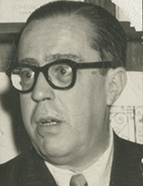

Upon his return from Germany in 1936, Holanda was appointed assistant professor to Henri Hauser (Modern and Economic History chair ) and Henri Tronchon (Comparative Literature) at the Faculty of Philosophy and Letters of the University of the Federal District. After the departure of the French professors, Holanda became an associate professor, teaching courses on the History of the Americas and Luso-Brazilian Culture. However, his tenure was short-lived, as the Federal District University was abruptly closed by the Vargas government in 1939. Despite the tightening of the dictatorship, Holanda continued to work in Rio de Janeiro as head of the Publications Section of the National Book Institute. In this role, he had the opportunity to collaborate with prominent figures of his generation, including Augusto Meyer, Carlos Drummond de Andrade, and Manuel Bandeira.
In 1941, at the invitation of the Division of Culture of the U.S. Department of State, Sérgio Buarque de Holanda delivered lectures on Brazilian history at various North American universities. In 1944, he became head of the Consultation Division at the National Library of Brazil, where he also taught Brazilian history courses to Library Science students. From this point onwards , a noticeable shift in his focus can be noted towards historical and historiographical studies, particularly after the publication of his book Monções (1945). This work reflects his experience as an editor, translator, and preface writer for rare and unpublished manuscripts. During this period, Holanda also established contact with Lewis Hanke, director of the Hispanic Foundation, and collaborated on significant bibliographic projects, such as the preparation of the Handbook of Brazilian Studies (1949). Co-organised by his friend Rubens Borba de Moraes and William Berrien, the handbook included Holanda’s bibliographic essay on the colonial period.
A critic of Vargas’s authoritarian regime, Holanda openly opposed the Estado Novo and was involved in founding the Esquerda Democrática [ Democratic Left ] in 1945, which later became the Brazilian Socialist Party in 1947. While still in Rio de Janeiro, he joined the leadership of the União Brasileira de Escritores [ Brazilian Writers’ Union ] , advocating for copyright legislation. In 1946, upon returning to São Paulo, he officially began his work as a historian at the Museu Paulista . He also assumed the chair of Brazilian Economic History at the Escola Livre de Sociologia e Política , succeeding its founder, economist Roberto C. Simonsen. During his tenure as a lecturer and researcher at the Museu do Ipiranga , Sérgio Buarque de Holanda worked alongside a distinguished group of ethnologists, including Herbert Baldus, Harald Schultz, and Egon Schaden. During this period, he prepared lectures that would later form the basis for several chapters of his books, Caminhos e Fronteiras [Paths and Frontiers] (1957), and Visão do Paraíso [Vision of Paradise] (1959). The latter was presented as part of his public examination for a teaching position at the Faculty of Philosophy, Letters, and Human Sciences at the University of São Paulo.
This work is financed by national funds through FCT - Foundation for Science and Technology, I.P, in the scope of the projects UIDB/04311/2020 and UIDP/04311/2020.
